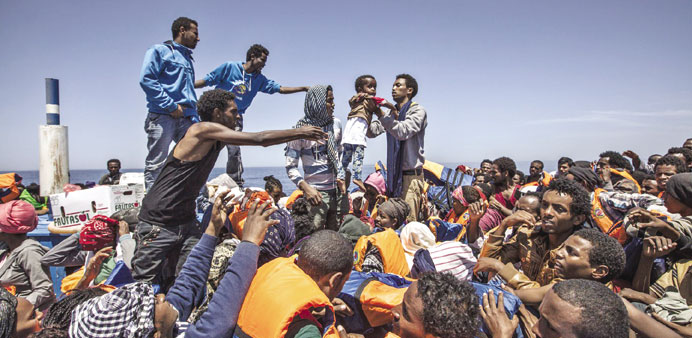In this handout picture taken on Sunday and released by the MOAS (Migrant Offshore Aid Station), migrants wait aboard a wooden boat during a rescue operation in partnership with Doctors Without Borders (Medecins Sans Frontieres, MSF) off the coast of Sicily.
Reuters/DPA/Rome
Around 7,000 migrants were rescued from overcrowded boats crossing the Mediterranean to Europe over the weekend and yesterday, including a woman who gave birth to a baby girl on an Italian navy ship, the coast guard said.
Numbers risking the journey in search of a better life have continued to rise two weeks after as many as 900 people drowned in the worst Mediterranean shipwreck in living memory.
Crew from the Italian navy ship Bettica found the woman in labour on a boat overnight – one of 34 vessels intercepted over the weekend.
A photo posted online showed her daughter, called Francesca Marina, sleeping in a makeshift cradle decorated with a pink bow.
Marina, a common name in Italy, also means navy in Italian.
“Both mother and daughter are in good health,” the navy said.
The two, whose nationalities were not given, were taken ashore at Pozzallo, a port in southern Sicily.
Navy ships were en route to another rubber boat with 89 people on board yesterday, and the privately-funded Phoenix rescue ship said it had already picked up 104 migrants.
The 40m Phoenix, based in Malta and run by the Migrant Offshore Aid Station (MOAS) and Doctors Without Borders, rescued 369 people, most of them Eritreans aboard a large wooden vessel on Sunday.
Among them was one pregnant woman and about 45 children, including babies, the MOAS said.
“The scale of this crisis is just heartbreaking,” Will Turner, emergency co-ordinator for Doctors Without Borders, said in a statement.
Growing lawlessness and anarchy in Libya – the last point on one of the main transit routes to Europe – is giving free hand to people smugglers who make an average of €80,000 ($90,000) from each boatload, according to an ongoing investigation by an Italian court.
Mild spring weather and calm summer seas are expected to push total arrivals in Italy for 2015 to 200,000, an increase of 30,000 on last year, according to an interior ministry projection.
Police in Spain said they had rescued 21 immigrants in a boat off the southern coast of the country yesterday.
On Sunday, seven bodies were found on two large rubber boats packed with migrants and three others died after jumping into the water when they saw a merchant ship approaching, the Italian coast guard said.
About 1,800 people are estimated to have perished during the crossing already this year, the UN refugee agency said.
Some 51,000 have entered Europe by sea, with 30,500 coming via Italy.
Shocked by last month’s record disaster, European Union leaders agreed to triple funding for the EU sea patrol mission Triton, but there is still disagreement on what to do with the people fleeing conflict and poverty in various parts of Africa and the Middle East.
Italy has co-ordinated the rescues by its own navy and coast guard, a French ship acting on behalf of the European border control agency, merchant ships of various nationalities and one vessel run by the MOAS.
According to Flavio Di Giacomo, spokesman for the Rome office of the International Organisation for Migration, some 30,000 boat migrants have landed in Italy this year, compared to 27,000 in January-April 2014.
“It’s not a big difference. What is really surprising and quite new is that since around mid-April a huge number of people arriving in a short period of time. Before, the arrival of migrants was much more spread out,” Di Giacomo.
The spokesman said the trend was putting undue strain on the Italian Coast Guard, and strengthened the need for a beefed-up international rescue presence in the stretch of water between Italian and North African shores.
Germany has also agreed to help. Two vessels – the frigate Hessen and the supply ship Berlin – arrived at the Greek island of Crete yesterday to be loaded with aid and personnel, according to a defence ministry spokesman in Berlin.
However, where exactly the German ships will be deployed remained unclear.
Along with Triton, the EU border control agency Frontex operates another sea mission off the coast of Greece, known as Poseidon.
In Brussels, the European Commission said Frontex was working out the details with Italy, Malta and Greece, so that “a new operational plan” for Frontex and Poseidon, setting out their expansion, could be adopted some time after Friday.
Meanwhile, a Libyan official warned the EU against plans to bomb the boats that smugglers use to ferry migrants.
Tripoli Mayor Mahdi al-Harati told the Times of Malta newspaper that such action would be “criminal”.
“Children and women live in these (coastal) areas,” al-Harati said. “Even if they target the boats alone, what will it solve? The smugglers will shift their business elsewhere.”
“What we need is co-operation and co-ordination between the coast guard operating in Libya and the authorities in Europe,” he added.
Smugglers operate freely in Libya, where a breakdown of law and order followed the Nato-backed overthrow of Muammar Gaddafi in 2011.
The North African country has become a launchpad for the overwhelming majority of Europe-bound migrants.
There are two rival governments in Libya, each backed by different militias, and only one, based in Tobruk, is recognised by the international community.
Neither of them has proved capable of stopping migrant boats.
Interior Minister Angelino Alfano – who travelled to Sicily to discuss the migration crisis with local security forces – said that Italy was “paying the price” of Libya’s chaos, and called for the help of the international community to “break up” migrant smuggling networks.

